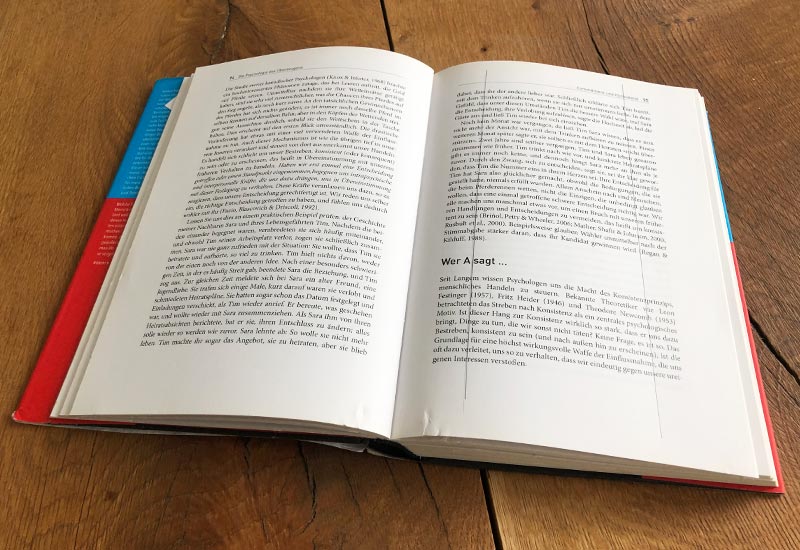What is speed reading and how can you read books faster? If you're looking for an answer to that, you've come to the right place. It's so wonderfully relaxing to let yourself be carried away slowly by a great novel. But with reference books or study guides, the main thing is to absorb knowledge as efficiently as possible. In the end, you simply make better use of your time and have less stress in your everyday life, increase your general knowledge and promotes concentration, memory and logical thinking.
Average, practiced readers achieve a reading speed of about 200-300 words per minute with a text that is easy to read - fast readers achieve about 1000 words without losing comprehension of the text. Above all, reading habits, concentration problems and a false perfectionism slow down the reading flow.
In this article, I would like to introduce you to valuable speed reading tips that will help you read and understand texts much faster in the future. If you implement them, I'm sure you'll be able to increase your reading speed by at least 50 percent. Let's go!
Here you can find a short overview in advance:
- Focus on the middle third of a page
- Recognize and use word groups
- Limit reading time with a timer
- First roughly skim chapters, then read them
- Read faster and prevent distractions
- Read challenging literature more often
- Identify insignificant paragraphs and skim only
- Expand vocabulary and look up unclear terms later
- Do exercises and repeat them regularly
- Test reading speed and measure progress
1. focus on the middle third of a page

Our eye sees not only a fixed word, but also other surrounding words. You can use this ability to read faster. Make (imaginary or real) lines on the left and right side of the page of a textbook.
Now the lines delimit about two thirds of the text. You do not fix with your eye all the words that appear in a line before or after the line. Instead, start with the first words within the delimited area and end with the last. With a little practice, you will be able to read much faster and more efficiently without losing reading quality.
2. recognize and use word groups
Effective speed reading is about constantly maintaining a balance between reading speed and text comprehension. Extremely helpful for this can be the so-called "Chunking" Be. Just read the text "chunky" by organizing it into word groups in your head as you read. For example, you read "in the city" instead of "in", "the", and "city".
This will be a bit unfamiliar at first, since your eye probably jumps from word to word when reading normally. But the grouping helps reduce the need for your eye and brain to fixate. And the fewer fixations, the faster a book page can be read. Two groups of words as fixed points per line are absolutely sufficient for skilled readers to read quickly and still fully internalize the content.
Tip: Use your index finger as an aid! Simply let it move at the desired speed in the direction of reading. This will also help you to focus instead of constantly sliding your eyes up or down one line.
3. limit reading time with a timer
How can you read books faster? It's simple! If you have a lot of time, you usually take a lot of time. If you want to read faster and more efficiently, you should definitely use a little psychological trick and limit your reading time. Simply set yourself a timer and a deadline. You will notice that you automatically read faster and more concentrated.
4. chapter first look roughly, then read
Get an overview of the next section of text or chapter before you "really read." Look at the Headlines, as well as quotations, images, infoboxes, bold text or ideally a bullet point summary at the end of the section to get valuable preliminary info, even though you're only skimming the text very roughly.
You can already guess what awaits you. This makes speed reading easier for you - and allows you to skip unimportant paragraphs without further ado.
5. read faster and prevent distractions

At "normal" reading speed remains a large part of your brain capacity unused so that you digress more easily. For this reason, you should literally read faster. In the end, you'll actually understand more of the content because of the increased reading speed.
In addition, it is advisable to avoid any Minimize disruptive factors - both in the reading process itself and in your surroundings. Cover words and passages you've already read, sit in a place free of distracting noises and flickering lights, and assume a comfortable posture. This will help you focus fully on the rest of the text.
Tip: Imagine that the text sections you read disappear as soon as you have internalized them - and that there is no going back. This way, you stay focused on the upcoming content and move forward faster.
6. read challenging literature more often
Speed reading can be trained! In order to become a really good speed reader, you should Read books as often as possible - and apply the tips from this post.
But don't just read easy-to-understand children's books; read really challenging nonfiction and technical articles. This is how you challenge yourself and your reading skills too and you'll quickly notice how easy it is for you to quickly read less demanding literature all at once.
7. identify insignificant paragraphs and only skim them
This speed reading tip is all about, read only the most important text passagesThe first and last paragraphs should be read consciously to make it easier to recognize them. In order to recognize them more easily, it is advisable to read the first and last paragraphs consciously. In this way, you will be able to identify more quickly whether these are main ideas or not-so-important secondary ideas of the text.
Tip: To use this tip for more efficient reading, you should be aware beforehand of what you expect to get out of reading each section or article. Once you know your goal, it will be easier for you to skim or even skip certain sections.
8. expand vocabulary and look up unclear terms later on.
Not every book reads "casually". Some texts are particularly challenging and require a large vocabulary. For example, because they deal with a topic you don't know or are simply not written in your native language.
If possible, you should simply make a note of any technical terms or words that are unfamiliar to you and research them later, so as not to constantly interrupt your reading flow. In many cases, the context of the text even reveals what was meant by the respective word.
You already realize: a large vocabulary helps you a lot to read faster. The richer it is, the better the text comprehension - and the higher the reading speed.
9. do exercises and repeat them regularly
As I said, you can train yourself to read quickly - but of course you have to do something about it. Be sure to implement the advice in this article on a regular basis, so that you can become second nature and, for example, you no longer need guides or other assistance.
Read so fast that you don't understand 10 percent of the text. Through such exercises you gradually penetrate into new spheres of your speed reading skills before.
10. test reading speed and measure progress

Run the stopwatch, pick up a book, and read any section as you normally would. Now read the same section again, using your new knowledge about speed reading.
In order not to have to read the same text all the time, I would advise you to use your approximate Calculate reading speed. And this is as follows:
- Simply count the number of words in a line to get a rough average number of words per line.
- Now multiply this by the number of lines on a page to get the number of words per page.
- Now read a certain text for one minute, see how far you get in one minute and roughly calculate what your reading speed is (in words per minute).
Practice your speed reading skills every day if possible, set target times, work towards them, and keep improving.
Speed reading: Fast reading can be learned!
It's really not difficult to devour reference books faster and more efficiently. With the tips mentioned above, you can increase your reading speed step by step without missing the really important content of a book. I'm sure you'll notice it after just a few exercises.
One more thing: It is often worthwhile to summarize what you have read and to briefly and concisely repeat the knowledge you have absorbed. Even though speed reading saves a lot of time, there is not always time for it in everyday life. If you still want to quickly acquire knowledge from books, I can recommend Blinkist*. The app aggregates the content of millions of reference books, making your learning curve even steeper.
Do you have any questions, tips or suggestions about speed reading? How do you manage to grasp text content more quickly? I look forward to your comments.
Stay curious,

PS.: In the next blog articles I will introduce you to the Advantages of reading books regularly in front of you. You'll also learn, Which books have changed my life. Have fun!





